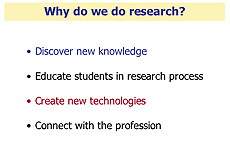|
|
Okay, so why do we do research? To discover new knowledge. To educate students. We also create new technologies. We create new things, new ideas. And we connect with the profession. So, an important piece of our charter, through our professional organizations, is to push those organizations forward in terms of new technologies and how those technologies can affect the practice of engineering.
So, how does research by professionals fit into the traditional academic model of discovery and education? Well, there was a famous report that was written at the end of the Second World War. Does anybody know who Vannevar Bush was? He was probably one of the most influential people of the 20th century. He was the singular scientific advisor to FDR during the Second World War. At the end of the Second World War, starting in 1944 and actually published after FDR died, he wrote the definitive study, “Science, the Endless Frontier: A Report to the President for the Program for Post-War Scientific Research,” which defined how science ran for the next 50 years as both an intellectual discipline and a business.
His view in this report was a one-dimensional or linear prescription for how science is done and how the science that is done affects the economy. First of all is the basic or pure research, which you all know is this quest for knowledge, as we've just talked about. But then, in this one-dimensional view, the output or the discoveries that come from that [quest] drive applied research, where applied research means that you're interested in an end product of some form.
>
01 02 03 04 05 06 07 08 09 10 11 12 13 14 15 16 17 18 19 |
|


|
